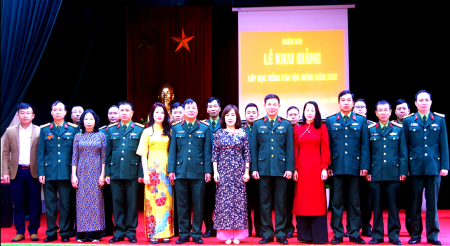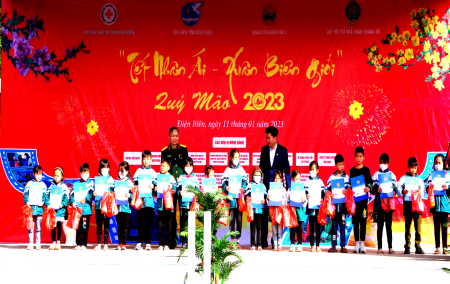II. The core role of the armed forces in the area - achievements and problems
In light of the high political determination of the Party and the State in the comprehensive development and construction of the Northwest region, the armed forces stationed within this area are acutely aware that this is not merely a duty or responsibility but also a sacred and significant commitment to the people of various ethnicities residing in the area. Therefore, officers and soldiers of the armed forces have unflinchingly faced difficulties, hardships, and sacrifices. They have dedicated their efforts with unwavering persistence through practical actions, working hand in hand with the local party committees, authorities, and the people of the Northwest to rise up in life and catch up with other regions in the country.
Significance outcomes from the dedication and persistence of “Uncle Ho’s Soldiers”
With their roles and functions as the “combat forces, workforces, and production labour forces”, the armed forces units in the Northwest have closely coordinated with various departments, sectors, organisations, and other forces to attach to local areas and communities, especially in border areas with multiple difficulties. Besides, they have implemented the “three attachments and four engagements” approach to disseminate the Party’s guidelines as well as the State’s policies and laws deeply among the people, fostering consensus and unity in awareness and action, providing the basis for organisation and implementation. During the 2018-2022 period alone, the armed forces units deployed hundreds of “outdoor missions for mobilisation work” by sending thousands of voluntary teams, officers, and young intellectuals to every hamlet, village, and household to carry out propaganda and mobilisation work. In particular, the Economic - Defence Unit 379 deployed 1,010 teams and 3,380 officers, professional soldiers, and young intellectuals to engage directly with the communes and villages in the mobilisation work. It is worth noting that during the process of incorporating the Party’s guidelines and directions into the people’s lives, these units closely combined various forms of propaganda, mobilisation, and national defence and security education to help the people improve their lives, eliminate outdated customs, stabilise their livelihoods, and build a new way of life. Simultaneously, they spread awareness among the people about the enemy’s conspiracies and plots, enhancing political awareness, and immunising them against the provocations of hostile forces.
 |
| A Mong language class held for cadres and staff of Defence-economic Unit 379 |
In their participation in economic, cultural, and social development, these units have advised and coordinated with local party committees and authorities to effectively implement resolutions, plans, and economic, cultural, and social development programmes. They have linked economic, cultural, and social development with strengthening national defence, security, and diplomacy. They have considered every growth step as a guarantee of progress and social justice. Additionally, they have actively responded to national movements, campaigns, and objectives related to poverty reduction, education, healthcare, gratitude, and new-style rural areas construction with innovative models and approaches that have had a significant impact on socio-economy as well as national defence and security, thus being a reliable support that enables people to transform crop structures and animal husbandry and apply advanced science and technology to production to intensify cultivation, increase yields, and enhance production efficiency. Moreover, driven by the spirit of serving the people, these officers and soldiers have shown no hesitation to difficulties and hardships, which are often encountered during disaster prevention and response, such as combating natural disasters, epidemics, forest fires, and search and rescue missions. Particularly, in the fight against the Covid-19 pandemic, border guard officers and soldiers often ate and slept in the forest while patrolling and controlling people and vehicles crossing the border according to epidemic prevention regulations, preventing the disease from entering their areas and contributing significantly to the nationwide effort to control the pandemic and stabilise people’s lives.
The establishment of a robust grassroots political system at the commune, ward, and township levels, enhancing the effectiveness and efficiency of its operations, is a shining achievement of the Northwest armed forces. These units have consistently maintained situational awareness and proactively assigned party members and officers to participate in the commune-level party committees and attend party meetings within local party cells and party-affiliated groups, thus fostering the party member development and eliminating the issue of “non-affiliated” party members in hamlets and villages. Building upon this foundation, they have selected and nurtured a pool of grassroots leaders. Moreover, they have organised training and development programmes to support the commune-level party committees, party cells, and local authorities, especially in newly separated or merged areas, to enhance leadership capabilities, combat readiness, management effectiveness, and operational efficiency. They have also cultivated strong mass organisations and implemented grassroots democratic regulations. During the 2015-2020 period, units in the region, particularly economic-defence units actively participated in constructing political bases in 1,236 communes. The Economic - Defence Unit 379 alone assisted localities in opening 3 party classes for 183 outstanding members, trained and inducted 103 new party members, contributing to the elimination of areas without party members, restructured 15 party organisations, reinforced 45 militia organisations, established 23 veteran associations, and activated 89 reconciliation teams to engage in various community activities and establish order.
The Northwest is a strategically significant region, endowed with numerous potentials and advantages but also beset by challenges and difficulties, especially threats to the region’s stability. Therefore, proactively combating crime to maintain political security, order, and social safety, particularly in border areas, underscores the pivotal role of the armed forces in this vital region. With high determination and responsibility, officers and soldiers of these units have consistently attached to and understood the local terrain, patrolled along border lines, successfully initiated, and executed numerous complex operations, and mobilised the active participation of people from various strata and local self-defence forces in border patrols to safeguard the border and counteract crimes, conspiracies, and subversive tactics by hostile forces. This is a matter of great importance, creating a favourable environment for the rapid and sustainable development of the Northwest.
With their relentless effort and dedication in terms of both physical strength and revolutionary spirit, the armed forces in this region have made a significant contribution to the development of the Northwest. Many areas that were previously arid and impoverished have now become shining examples in terms of national defence, security, and development, providing a prosperous and healthy spiritual life to the diverse ethnic communities. As a result, the people’s trust in the Party, the State, the socialist regime, and the armed forces has been elevated, and the “people’s hearts and minds posture” has become increasingly steadfast, thus creating a favourable environment for the continued development of the region in the new period.
 |
| Leader of Defence-economic Unit 379 presents gifts for pupils with difficulties |
Problems ahead
Despite continuous attention and investment from the Party and the State, the dedicated involvement and responsibility of various levels, sectors, and armed forces, as well as the efforts of local party committees, authorities, and people, the Northwest provinces remain a region of low level of development and “poverty-stricken cores” of the country that face numerous difficulties and challenges. In terms of the economy, there has been some transformation and growth; however, the production scale remains small and fragmented with traditional practices still prevailing, especially in border areas. Additionally, geographical constraints and challenging transportation hinder economic development; harsh weather conditions that are unfavourable for livestock and agriculture, along with natural disasters such as floods, landslides, and soil erosion, have caused significant damage to both individual and public property, which makes recovery efforts difficult and costly. Although the policies and regulations related to the Northwest, especially those concerning ethnic minorities, have seen some improvements, they still exhibit deficiencies. These policies predominantly focus on support and have not sufficiently stimulated the development of local resources or brought fundamental changes in livelihoods for ethnic minority communities. Furthermore, the planning, investment, and development of economic infrastructure are still of low quality, lacking in alignment, synchronisation, and unity and there are conflicts, contradictions, and overlaps between economic infrastructure development and other sectors. Effective policies on production zoning, environmental protection and regeneration, landscape restoration, and preservation of living spaces for ethnic minorities.
In the field of culture and society, several challenges persist. The quality of education and training, as well as the development of human resources in some localities, do not meet the set requirements. The proportion of labour force through training is lower than the national average, and many bureaucratic procedures still exist. Investment in infrastructure for transportation, healthcare, education and training, clean water, etc. in remote and ethnic minority areas remains insufficient. Besides, the investment structure is not reasonable and widespread, and the utilisation of resources is not highly efficient. Moreover, the complex and uncontrolled nature of migration has become a significant issue. Religious activities and beliefs have undergone various changes, with a trend towards the abandonment of traditional beliefs in favour of conversion to Christianity, thus leading to increased complexities and social repercussions.
There are still several limitations in the grassroots political system in some border areas. The leadership, management, and administration capacity of party committees, authorities, and organisations do not fully meet the requirements of development. The cadres and party members have limitations in terms of theoretical knowledge and expertise, which affects the effectiveness of their work and their ability to mobilise the masses.
In the fields of national defence, security, and foreign affairs, the foundations have been generally maintained and strengthened, yet there are also potential risks that could lead to instability. Hostile forces continue to intensify their propaganda efforts, fostering a sense of national guilt and inferiority among ethnic groups. They organise illegal missionary groups, entice and gather crowds to oppose the government, aiming at “secession” and “coronation” while attempting to establish a so-called autonomous “Mong State”. In addition, criminal activities such as border crossing, drug trafficking, human trafficking, commercial fraud, and transnational crimes, etc. are complicated, posing many difficulties and challenges to the task of maintaining security and order, protecting territorial sovereignty, and consolidating the traditional good neighbourly relations between the provinces in the Northwest and the bordering regions of Laos and China.
The current situation poses challenges for the entire Party, the entire people, and the entire armed forces, with a direct focus on the party committees, authorities, people, and the armed forces in the region. It is necessary to thoroughly study and understand the situation, especially the limitations, weaknesses, difficulties, obstacles, and shortcomings. Assessing the subjective and objective causes as well as the factors that directly or indirectly affect the construction and development of the region. Based on this, it is crucial to identify the issues that need attention and resolution. These include intensifying propaganda and raising the awareness of all social strata about the Party’s guidelines, the State’s policies and laws. Enhancing the quality and effectiveness of socio-economic development while ensuring and strengthening national defence and security. Implementing social welfare policies effectively to improve the material and spiritual lives of the people. Strengthening the construction of a strong political base and enhancing the comprehensive leadership capacity of party committees at all levels and the efficiency of management of government authorities at all levels. Resolutely combating crime and the subversive activities of hostile forces to maintain social order and safety. Enhancing relationships and diplomacy with neighbouring countries, building a peaceful, cooperative, and developmental border area. These are fundamental issues aimed at harnessing the comprehensive strength of various levels, sectors, and localities, including the armed forces in the region, in order to successfully implement the Party’s resolution on the “green, sustainable, and comprehensive” development of the Northwest.
(Next: III. Determined to join hands and unite with the people to develop a “green, sustainable and comprehensive” Northwest)
DUC PHU – HOANG TRUONG – VIET VUONG